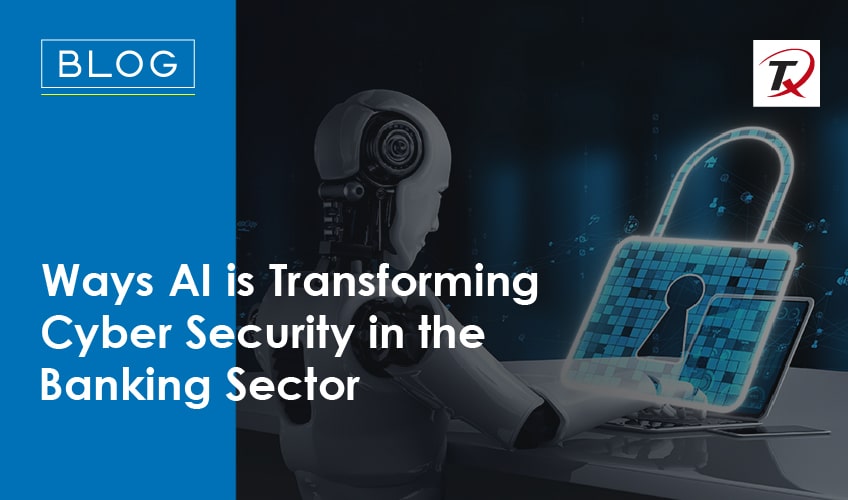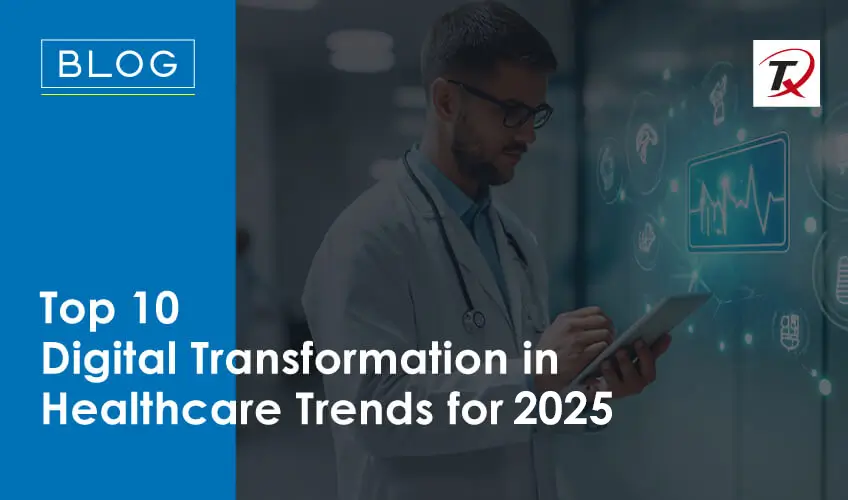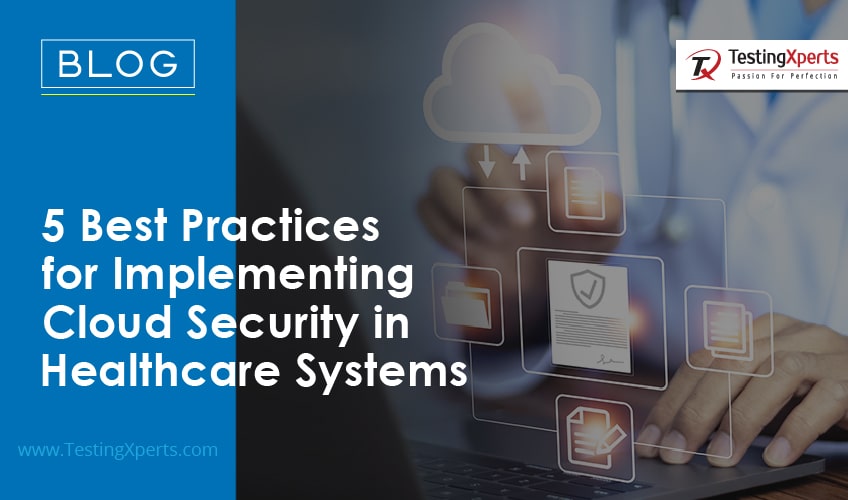
Table of Contents
- Cloud Services in Healthcare
- Cloud Security Issues in Healthcare
- Five Cloud Security Best Practices in Healthcare Systems
- How Does Cloud Security Testing Impact Healthcare Systems?
- Conclusion
- Why Partner with TestingXperts for Cloud Security Testing?
In recent years, the integration of cloud technology into healthcare systems has helped to improve patient care and operational effectiveness. But this development comes with increased cybersecurity threats. Dependence on digital solutions such as digital health records, cloud services, and remote patient monitoring mechanisms have increased the probability of attacks by cybercriminals, making healthcare data more defenseless than ever. Data shows that remote patient monitoring is predicted to increase in 2024, raising the quantity of devices linked to medical care networks. If these devices are not properly protected, they can pose considerable cybersecurity dangers. Additionally, research uncovered that 83% of hospital framework was powered by outdated programming, mostly Windows 7 systems lacking support, making them vulnerable to digital assaults.
The healthcare industry continues facing technological risks and dealing with the real impacts of cyberattacks. For example, ransomware attacks, which encrypt data or systems demanding ransom for decryption, have become disturbingly frequent. In only four nations, approximately 1,900 ransomware incidents occurred between 2022 and 2023. These incidents aim at critical systems like electronic health records, triggering primary patient care and workflow disruptions.
Furthermore, healthcare data breaches pose serious consequences, spanning from postponed procedures and screenings to increased difficulties in medical operations. It prompts worries concerning the security of data being transferred to the cloud and why testing is significantly required to modernize healthcare networks effectively.
Cloud Services in Healthcare
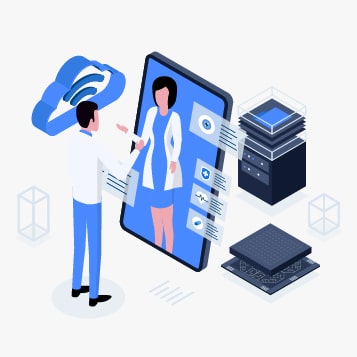
Cloud computing has reformed the healthcare sector, offering diverse benefits and transforming how medical services are administered. Cloud computing in healthcare entails utilizing distant servers organized online to store, control, and deal with data instead of local servers or individual PCs.
Electronic Health Records (EHRs) stored securely in the cloud can benefit both healthcare providers and patients. With EHRs hosted online, doctors and nurses have immediate access to comprehensive, current patient data. This enables more precise diagnoses and tailored care strategies. Cloud-based EHRs also facilitate effortless information exchange between diverse care teams. When all relevant clinicians can easily view and build upon the full medical history, collaboration is strengthened. Errors are less likely to occur as well. Overall, hosting EHRs on the cloud has the potential to significantly improve the delivery of healthcare by promoting real-time coordination and optimized decision-making supported by complete medical records.
Cloud computing has enabled another significant healthcare area – telemedicine. With remote patient monitoring on the rise, especially during the COVID-19 pandemic, cloud technology has empowered healthcare providers to deliver consultations, diagnostics, and various health services from afar. This solution has made healthcare both more accessible and efficient by decreasing the necessity for in-person visits and optimizing the utilization of healthcare assets. Remote care allows practitioners to assist patients located distantly, expanding the reach of services while reducing transportation needs.
Additionally, cloud computing plays an integral role in medical study and data analysis. The tremendous volumes of healthcare information gathered can be saved and examined in the cloud, allowing researchers to recognize patterns, enhance treatments, and make pioneering medical breakthroughs. This information evaluation can result in more customized medicine, adapting therapies to meet specific patient requirements and states.
While cloud computing provides opportunities for healthcare organizations, responsibility to patients remains a priority. Storing sensitive patient information externally necessitates diligent security protocols to defend privacy. Compliance with regulations like HIPAA helps ensure data confidentiality and control. Adhering closely to established security standards protects those relying on healthcare systems by safeguarding details that, if accessed improperly, could harm individuals. Maintaining the integrity of information and systems reflects care for all.
Cloud Security Issues in Healthcare
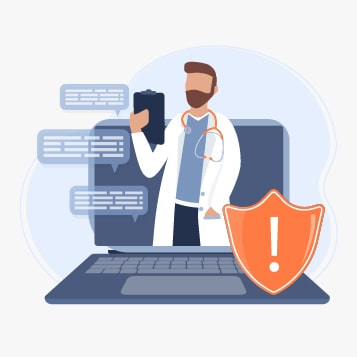
Healthcare organizations must carefully consider security as the adoption of cloud computing rises. Moving to cloud services provides advantages, yet also brings distinctive security risks that demand focus. Due to the sensitive nature of personal health information, addressing security concerns with the highest priority protects patient privacy and ensures legal compliance. As systems increasingly leverage remote computing, comprehending and solving associated issues becomes critical to preserving trust while gaining the cloud’s benefits.
A key concern regarding healthcare cloud computing relates to data security breaches. Such breaches can arise from various causes, such as ineffective authentication methods, inadequate encryption, and infrastructure vulnerabilities at the cloud service provider. Compromising patient information poses grave consequences, involving privacy violations and serious legal and financial issues for the impacted healthcare entity.
The next issue relates to the vulnerability of ransomware attacks. Healthcare frameworks are perfect targets for these assaults because of the critical nature of patient information and the dire need of medicinal services administrations. Ransomware can leak vital patient information, making it inaccessible and fundamentally disturbing medical care tasks.
Furthermore, the interconnectivity between disparate healthcare systems and devices, though advantageous for patient care, can introduce security vulnerabilities. When multiple systems share data, the security is only as strong as the weakest link. Guaranteeing uniform security protocols across all interfaces and technologies is a complicated process.
Adhering to guidelines such as the Health Insurance Portability and Accountability Act (HIPAA) is also a substantial concern in cloud computing. Healthcare providers must confirm that their cloud service providers follow these regulations, which is not consistently simple. Interpreting the complexities of legal adherence while investing in cloud technology demands a comprehensive knowledge of legal and technical facets.
Finally, the insider threat, whether deliberate or accidental, is a significant security concern. Individuals working within or associated with healthcare organizations who have access to medical systems can unintentionally or maliciously jeopardize data protection. This threat requires robust internal protection policies and staff education on optimal cybersecurity methods.
5 Cloud Security Best Practices in Healthcare Systems
In today’s digital world, where cloud computing plays a vital role in healthcare, adopting strong cloud security practices is helpful and necessary. As healthcare groups deal with the challenges of digital transformation, making cloud security a priority guarantees the safety of private patient information and following strict rules. The following five practices are essential for healthcare networks to strengthen how they secure their cloud environment.

Implement Robust Access Management:
One of the basic necessary actions in protecting cloud information is regulating who can access it. This involves building robust user validation protocols, like multi-step authentication, and confirming access authorizations are assigned depending on a need-to-know basis. Frequently examining access controls can stop unauthorized access and decrease the chances of information security incidents.
Data Security Is Crucial for Sensitive Patient Information:
Encrypting data when stored and transmitted is essential for protecting confidential patient details and encoding data renders it unreadable and unusable even if intercepted or accessed improperly. Healthcare facilities must guarantee that encryption measures are strong and follow best industry practices.
Adhere to Regulatory Guidelines:
Healthcare facilities must abide by various rules such as HIPAA, which requires strong patient data confidentiality and security protocols. Meeting these guidelines is a legal necessity and builds trust with patients. Regular compliance audits and updates to security policies in line with evolving rules are necessary.
Continually Educate Employees on Security Matters:
One of the largest vulnerabilities organizations face involves human mistakes. Implementing consistent staff training on current security risks and recommended solutions can mitigate this threat. Instruction should cover spotting phishing scams, properly managing sensitive information, and knowing security procedures.
Create a Thorough Security Incident Response Strategy:
No matter the preventative measures taken, the chance of a security issue remains. A defined security incident response strategy can notably reduce harm should such an occurrence happen. This strategy must include processes for swiftly detecting, limiting, and reacting to security incidents, as well as communication tactics for engaging stakeholders once a breach has transpired.
How Does Cloud Security Testing Impact Healthcare Systems?
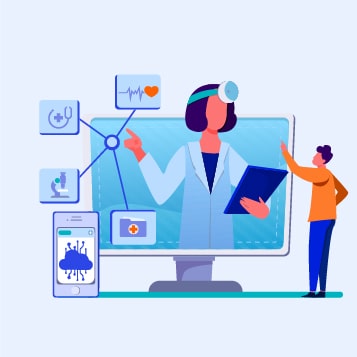
Testing the security of cloud-based systems is a key part of safeguarding healthcare networks that utilize cloud computing. This procedure includes analyzing and examining the security of cloud-based services and infrastructure to find weak points and deal with them preemptively. The consequence of cloud security testing on healthcare networks is considerable and manifold.
To begin with, testing the security of cloud systems guarantees the safeguarding of sensitive patient details. By pinpointing weaknesses in cloud services, healthcare organizations can avoid data violations that may result in approved access to patient information. This is crucial provided the sensitive characterstics of health data and the serious implications of its misapplication.
Additionally, consistent security testing aids in upholding adherence to healthcare regulations like HIPAA. These rules mandate rigorous data security steps and failing to comply can cause substantial fines and authorized difficulties. Security testing confirms that healthcare structures stay current with compliance and regulations, thus safeguarding against legal and financial repercussions.
The handling of patient data also affects how trustworthy and dependable the healthcare system appears to patients and stakeholders. If patients are aware their information is managed safely, their belief in the medical system is reinforced. Conducting cloud security testing exhibits, a thorough approach to protecting patient files, in turn elevating the image of the healthcare organization.
Furthermore, cloud security testing aids in optimizing system performance and efficacy. By pinpointing and solving security defects, healthcare systems can prevent downtime and interruptions caused by cyberattacks. This guarantees that healthcare services are conveyed effortlessly and productively, which is essential for patient care and operational achievement.
Conclusion
Cloud security in the healthcare industry is especially important today, considering how cloud technologies are used. Strong access control, data security encryption, implementation in a regulatory compliance area, personnel staff training and structure on incident response plan implementation are the main practices that can significantly increase the cloud security level in healthcare. In addition, consistent cloud testing for safety is necessary to ensure privacy protection and availability of sensitive patient data. This acceptance and integration of best practices will create a more productive, resilient, and trusted healthcare system in the digital age.
Why Partner with TestingXperts for Cloud Security Testing?

Choosing the right partner for cloud security testing is crucial for healthcare systems aiming to safeguard their digital infrastructure. TestingXperts stands out as a leading choice for this critical task with its specialized expertise in cloud security, offering comprehensive solutions tailored to the unique needs of the healthcare sector.
TestingXperts’ key differentiators include:
• We have in-depth knowledge and experience in addressing the specific cloud security challenges of the healthcare industry.
• Utilizing the latest tools and methodologies, TestingXperts conducts thorough security assessments. Their approach includes penetration testing, vulnerability assessments, cloud configuration reviews, and compliance checks, ensuring a multi-layered security evaluation.
• We offer customized security testing solutions to develop strategies aligning with organizational goals and regulatory requirements.
• With a focus on regulatory compliance, TestingXperts ensures that healthcare systems meet and exceed industry standards such as HIPAA. Our commitment to best practices in cloud security provides a robust defence against emerging cyber threats.
• We don’t just identify vulnerabilities but also provide ongoing support to address them. Our commitment to continuously improving security postures helps healthcare organizations avoid potential security risks.
• To know more, contact our QA experts now.
Discover more
Get in Touch
Stay Updated
Subscribe for more info



